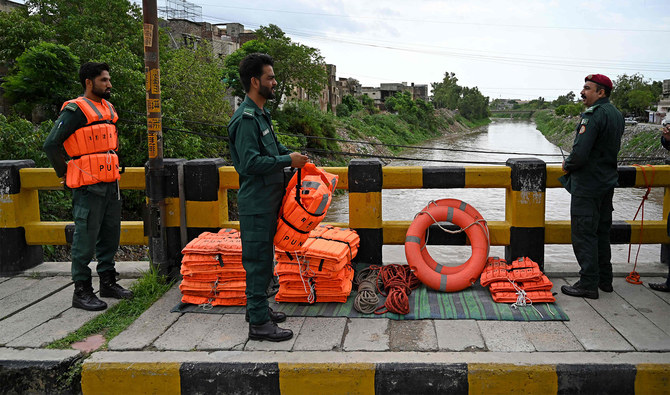ISLAMABAD: The National Disaster Management Authority has predicted heavy rainfall in several regions of the country in the next 48 hours and warned of floods in at least three major rivers and their associated channels.
Heavy monsoon rains have been lashing Pakistan since last week, causing deaths, flooding roads and disrupting lives in areas where residents already were struggling to recover from floods last summer that affected 33 million people and killed 1,739.
Over 55 people, including at least eight children, have died in weather-related incidents in Pakistan in the last two weeks, authorities have said.
Sharing its projection for the next 48 hours on Saturday night, the NDMA warned of severe thunderstorms and heavy rainfall in north and northeastern Punjab, including the cities of Lahore, Sialkot and Narowal, with flooding expected in the Chenab, Ravi and Sutlej rivers and their associated channels. It also warned of urban flooding in municipal and land sliding in hilly areas.
“In Sindh (Karachi, Tharparkar, Sukkur, Larkana, Hyderabad, Badin, Shaheed Benazirabad) is likely to experience thunderstorms/hvy rainfall,” NDMA said, adding that thunderstorms and rainfall were also expected in parts of the southwestern Balochistan province.
In light of rain and flood projections, NDMA instructed district and city administrations across the country “to ensure contingency traffic plans for areas vulnerable to flooding in urban centers, catering for prompt de-watering operations in flooded underpasses.”
“Rescue Services & leading NGOs will ensure availability of personnel in the indicated areas. All stakeholders to maintain proactive coordination in order to ensure prompt & streamlined response.”
Monsoon rains have returned to Pakistan a year after a climate-induced downpour swelled rivers and inundated at one point one-third of Pakistan, causing $30 billion in damage in cash-strapped Pakistan in 2022.
The monsoon season officially started last week and will continue until September in the South Asian country.







